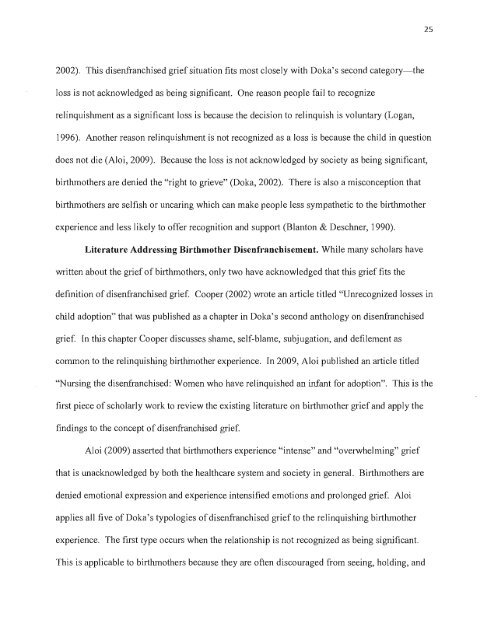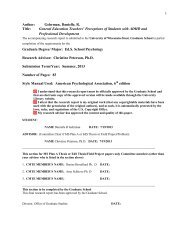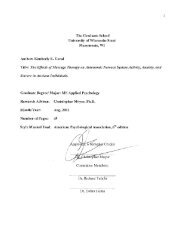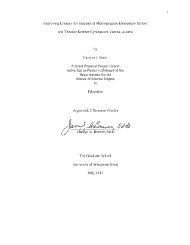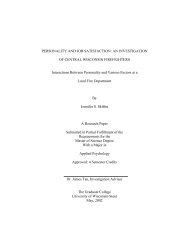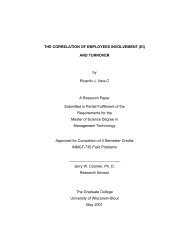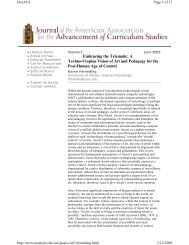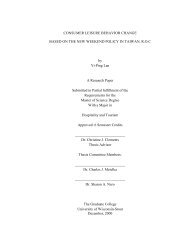A Review of the Literature on Three Types of Disenfranchised Grief ...
A Review of the Literature on Three Types of Disenfranchised Grief ...
A Review of the Literature on Three Types of Disenfranchised Grief ...
You also want an ePaper? Increase the reach of your titles
YUMPU automatically turns print PDFs into web optimized ePapers that Google loves.
2002). This disenfranchised grief situati<strong>on</strong> fits most closely with Doka's sec<strong>on</strong>d category-<str<strong>on</strong>g>the</str<strong>on</strong>g><br />
loss is not acknowledged as being significant. One reas<strong>on</strong> people fail to recognize<br />
relinquishment as a significant loss is because <str<strong>on</strong>g>the</str<strong>on</strong>g> decisi<strong>on</strong> to relinquish is voluntary (Logan,<br />
1996). Ano<str<strong>on</strong>g>the</str<strong>on</strong>g>r reas<strong>on</strong> relinquishment is not recognized as a loss is because <str<strong>on</strong>g>the</str<strong>on</strong>g> child in questi<strong>on</strong><br />
does not die (Aloi, 2009). Because <str<strong>on</strong>g>the</str<strong>on</strong>g> loss is not acknowledged by society as being significant,<br />
birthmo<str<strong>on</strong>g>the</str<strong>on</strong>g>rs are denied <str<strong>on</strong>g>the</str<strong>on</strong>g> "right to grieve" (Doka, 2002). There is also a misc<strong>on</strong>cepti<strong>on</strong> that<br />
birthmo<str<strong>on</strong>g>the</str<strong>on</strong>g>rs are selfish or uncaring which can make people less sympa<str<strong>on</strong>g>the</str<strong>on</strong>g>tic to <str<strong>on</strong>g>the</str<strong>on</strong>g> birthmo<str<strong>on</strong>g>the</str<strong>on</strong>g>r<br />
experience and less likely to <str<strong>on</strong>g>of</str<strong>on</strong>g>fer recogniti<strong>on</strong> and support (Blant<strong>on</strong> & Deschner, 1990).<br />
<str<strong>on</strong>g>Literature</str<strong>on</strong>g> Addressing Birthmo<str<strong>on</strong>g>the</str<strong>on</strong>g>r Disenfranchisement. While many scholars have<br />
written about <str<strong>on</strong>g>the</str<strong>on</strong>g> grief <str<strong>on</strong>g>of</str<strong>on</strong>g> birthmo<str<strong>on</strong>g>the</str<strong>on</strong>g>rs, <strong>on</strong>ly two have acknowledged that this grief fits <str<strong>on</strong>g>the</str<strong>on</strong>g><br />
definiti<strong>on</strong> <str<strong>on</strong>g>of</str<strong>on</strong>g> disenfranchised grief. Cooper (2002) wrote an article titled "Unrecognized losses in<br />
child adopti<strong>on</strong>" that was published as a chapter in Doka's sec<strong>on</strong>d anthology <strong>on</strong> disenfranchised<br />
grief. In this chapter Cooper discusses shame, self-blame, subjugati<strong>on</strong>, and defilement as<br />
comm<strong>on</strong> to <str<strong>on</strong>g>the</str<strong>on</strong>g> relinquishing birthmo<str<strong>on</strong>g>the</str<strong>on</strong>g>r experience. In 2009, Aloi published an article titled<br />
"Nursing <str<strong>on</strong>g>the</str<strong>on</strong>g> disenfranchised: Women who have relinquished an infant for adopti<strong>on</strong>". This is <str<strong>on</strong>g>the</str<strong>on</strong>g><br />
first piece <str<strong>on</strong>g>of</str<strong>on</strong>g> scholarly work to review <str<strong>on</strong>g>the</str<strong>on</strong>g> existing literature <strong>on</strong> birthmo<str<strong>on</strong>g>the</str<strong>on</strong>g>r grief and apply <str<strong>on</strong>g>the</str<strong>on</strong>g><br />
findings to <str<strong>on</strong>g>the</str<strong>on</strong>g> c<strong>on</strong>cept <str<strong>on</strong>g>of</str<strong>on</strong>g> disenfranchised grief.<br />
Aloi (2009) asserted that birthmo<str<strong>on</strong>g>the</str<strong>on</strong>g>rs experience "intense" and "overwhelming" grief<br />
that is unacknowledged by both <str<strong>on</strong>g>the</str<strong>on</strong>g> healthcare system and society in general. Birthmo<str<strong>on</strong>g>the</str<strong>on</strong>g>rs are<br />
denied emoti<strong>on</strong>al expressi<strong>on</strong> and experience intensified emoti<strong>on</strong>s and prol<strong>on</strong>ged grief. Aloi<br />
applies all five <str<strong>on</strong>g>of</str<strong>on</strong>g> Doka's typologies <str<strong>on</strong>g>of</str<strong>on</strong>g> disenfranchised grief to <str<strong>on</strong>g>the</str<strong>on</strong>g> relinquishing birthmo<str<strong>on</strong>g>the</str<strong>on</strong>g>r<br />
experience. The first type occurs when <str<strong>on</strong>g>the</str<strong>on</strong>g> relati<strong>on</strong>ship is not recognized as being significant.<br />
This is applicable to birthmo<str<strong>on</strong>g>the</str<strong>on</strong>g>rs because <str<strong>on</strong>g>the</str<strong>on</strong>g>y are <str<strong>on</strong>g>of</str<strong>on</strong>g>ten discouraged from seeing, holding, and<br />
2S


